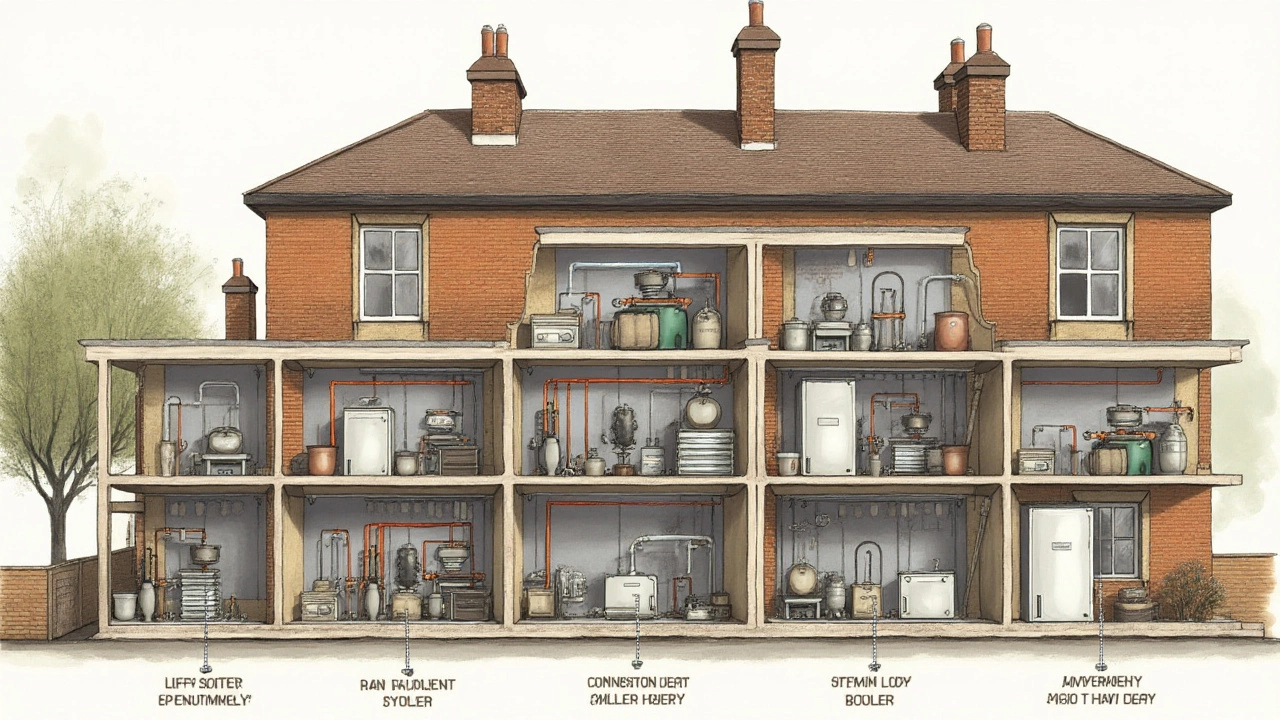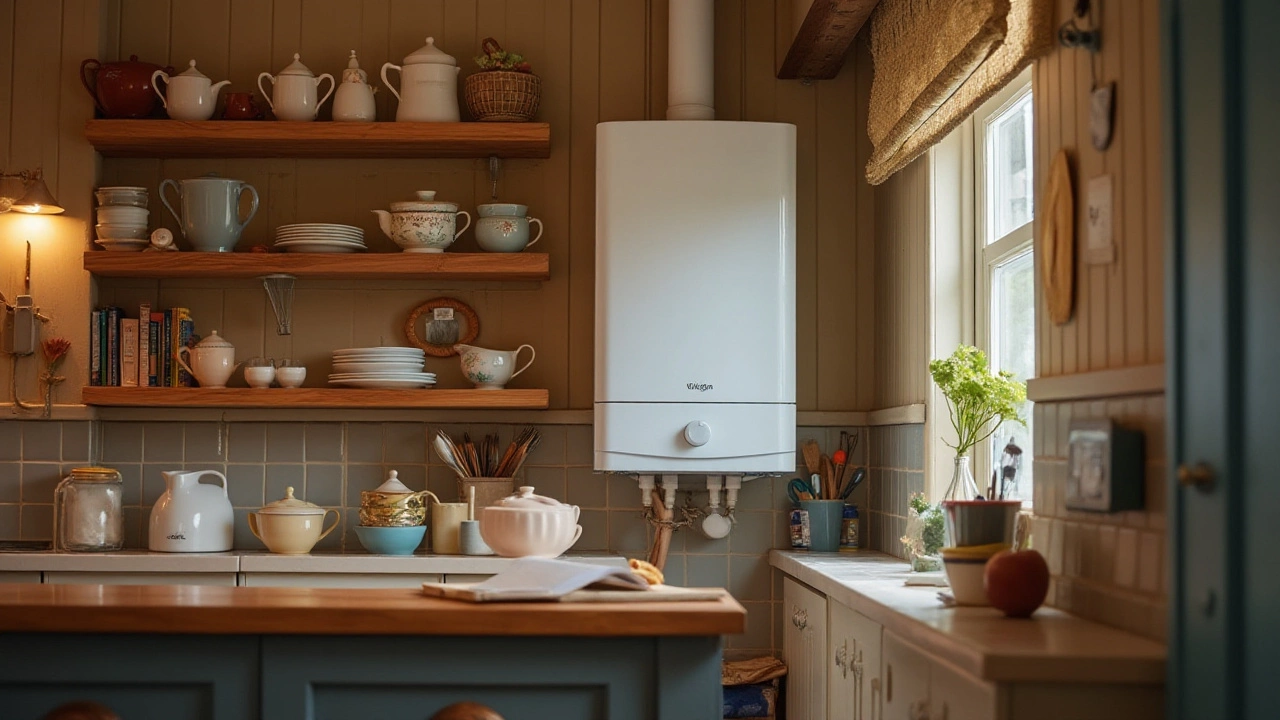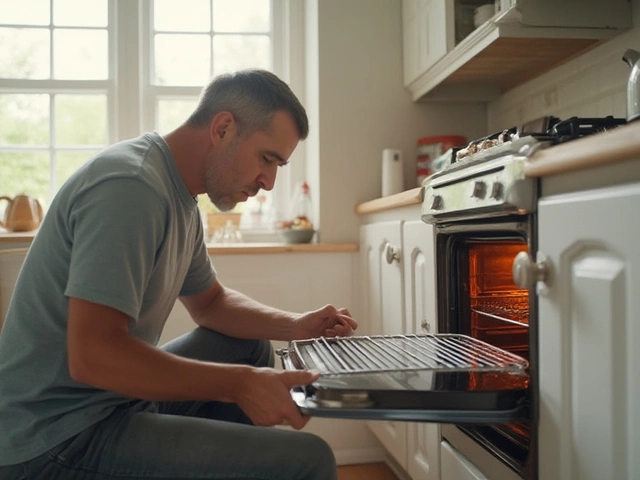Boilers, often tucked away in the corners of our homes, work tirelessly to ensure we have hot water and warmth when the chill outside is biting. Yet, like all good things, they don't last forever. But just how many years can you really expect from these stalwarts of home comfort?
The lifespan of a boiler is not set in stone and can vary depending on several factors, including the type of boiler, how well it's maintained, and how heavily it's used. While some boilers soldier on for decades, others may show signs of aging within a shorter timeframe. Understanding these variables can help you make informed decisions about when to invest in repairs or begin considering a replacement.
In this article, we'll walk through the essential information you need to keep your boiler running efficiently and safely for as long as possible. From spotting early symptoms of wear to practical maintenance tips, you'll find everything you need to maximize the life of your heating system.
- Understanding Boiler Lifespan
- Factors Affecting Longevity
- Recognizing Signs of Wear
- Maintenance Tips for Extended Life
- When to Consider Replacement
Understanding Boiler Lifespan
In the realm of home heating solutions, boilers have stood the test of time due to their rugged design and reliability. A typical boiler's lifespan can range from 10 to 15 years, but many factors come into play that can either extend or shorten this timeline. The type of boiler, such as a combi, system, or conventional boiler, plays a significant role. Each has unique mechanisms and components, influencing how long they can effectively function. Generally, high-quality models that are well-maintained are known to push beyond the 15-year mark.
Regular maintenance is indeed a critical factor in determining how long your boiler will last. Just as a car requires regular oil changes and tire rotations, boiler maintenance includes tasks like bleeding the radiators, flushing out the system, and periodically checking various components like valves and thermostats. This upkeep can not only extend your boiler's life but also ensure it operates safely and efficiently. Neglecting these steps could mean dealing with a boiler replacement much sooner than anticipated.
Interestingly, the location and usage level can significantly influence a boiler's lifespan. Boilers in larger households or those in colder climates may work harder and longer, potentially leading to a reduced lifespan. However, strategic placement of the boiler where it can function without undue strain—like avoiding damp or overly constricted spaces—can mitigate these risks.
Technological Advancements and Boiler Efficiency
Technologically advanced boilers now include features that can enhance efficiency and longevity. Modern models are often equipped with smart controls, which allow better management of heat distribution, reducing unnecessary strain. This innovation means today's boilers often have a greater potential lifespan than those built a few decades ago. However, frequent innovations also mean keeping your system upgraded to harness these benefits fully.
Performance efficiency, too, deserves a mention here. An efficiently running boiler not only cuts down on energy bills but also places less strain on the components. With the rise in energy-efficient technology, upgrading to a newer model might sometimes be more cost-effective in the long run than continuously servicing an aging boiler system. For instance, a study showed that upgrading to a high-efficiency model reduced energy consumption by up to 20%, which translates into significant savings on utility bills.
A wise homeowner once shared, "The initial cost of a high-efficiency boiler may seem steep, but the energy savings over time pay back every penny."
Let’s not forget about manufacturer warranties. Many modern boilers come with warranties spanning up to 12 years. These warranties often provide a clear idea of how long manufacturers expect their products to last under normal operation, providing homeowners with some peace of mind. Yet, it's important to carefully adhere to maintenance schedules to ensure these warranties remain valid.
In essence, understanding your boiler's lifespan is more than just placing a number on your heating unit's service years. It requires an awareness of the various influences, such as maintenance, usage, and technological updates. Whether you're prolonging the life of an existing unit or contemplating the purchase of a new one, these insights can guide you towards a savvy investment, ensuring warmth and comfort in your home year after year.
Factors Affecting Longevity
When it comes to the lifespan of your boiler, several crucial factors come into play that can significantly influence how many winters your boiler will keep you cozy. First and foremost is the type of boiler you have nestled in your home. Conventional boilers, for instance, are known for their robustness and can last upwards of 20 years with proper care. On the other hand, high-efficiency condensing boilers, though more economical on energy usage, might not stretch out their lifespan quite as long, often needing replacement after about 15 years. Understanding these differences can help set realistic expectations and inform your maintenance routine accordingly.
Another critical element is the quality of installation. Every year, countless homeowners are left frustrated not due to faulty products but poor installation practices. A well-installed boiler can avoid many common pitfalls that lead to preemptive breakdowns. This is why it's essential to hire experienced and certified professionals to carry out the installation. A poorly installed system can lead to persistent issues that not only cause inconvenience but can also drastically shorten the lifespan of the boiler.
When pondering the longevity of boilers, one cannot overlook the importance of regular maintenance. Regular servicing is like a health check-up, catching potential issues before they transform into costly repairs. During these check-ups, technicians check for signs of wear, clean components, and ensure that everything is running smoothly. Neglecting these check-ups is akin to ignoring the oil changes and tire rotations on your car – a risk not worth taking. Moreover, water quality also plays a pivotal role. Hard water, which contains high levels of calcium and magnesium, can wreak havoc on your boiler by forming scale that insulates your heating system, reducing efficiency and adding strain.
Usage patterns also dictate how long your boiler might last. Naturally, a boiler that is continuously running at high capacity will experience more wear and tear compared to a system that sees intermittent use. Houses with consistent high demand for hot water and heating need to ensure more frequent servicing. These continued cycles of demand cause more strain, and without attentive maintenance, can culminate in earlier-than-expected replacements.
"Boilers are integral to our everyday comfort, but like any other mechanical workhorse, it needs attention and care to optimize its longevity," explains renowned engineer Dr. Sylvia Brown, emphasizing that proactive maintenance is a smart investment for homeowners.
Lastly, technological advancements in boiler design mean that newer models come equipped with features that not only increase efficiency but also extend lifespan. Better materials, improved controls, and enhanced safety features prevent excessive wear and tear, keeping your system operational for longer. Keeping abreast of these technological trends and updates could mean the difference between a costly premature replacement and a boiler that gives you years of worry-free service. By considering all these factors, you can make informed decisions to relish the full potential of your boiler's lifespan and avoid unexpected surprises.

Recognizing Signs of Wear
Every boiler, no matter how robust or well-made, will inevitably show signs of wear as it ages. Understanding these signs and being proactive in addressing them can save homeowners not only from inconvenience but from potentially costly repairs. It's akin to catching a cold early on and taking all the right precautions before it turns into something much nastier. So, what should you be on the lookout for when it comes to your boiler's lifespan?
One of the first indicators your boiler is starting to feel its age is an increase in noise. While a low, consistent hum is normal, banging, clunking, or whirring could suggest that parts are not as secure as they should be or are wearing out. Such sounds can often indicate issues with the pump or fan or the build-up of limescale, particularly in hard water areas. Another tell-tale sign is uneven heating or difficulty in reaching the desired temperature. If rooms are taking an eternity to warm up or if the hot water supply is more temperamental than it used to be, there might be underlying efficiency problems at play.
"A gradual drop in heating efficiency can be fairly subtle," notes Jane Clary of the National Association of Home Builders, "but it's often a sign your boiler is crying out for attention."
An unexplained uptick in energy bills can also be a significant indicator that your boiler is losing efficiency. Older systems tend to use more energy to achieve the same results as they strain to meet your daily needs. It is worth comparing your current energy usage to past seasons to see if there's a noticeable increase. Additionally, check for any unusual odors emanating from around the boiler. A faint smell of gas or burning could indicate a range of issues, from leaks to internal overheating, each requiring immediate attention.
Apart from these symptoms, regular maintenance checks can reveal less visible signs of wear. Technicians can spot corrosion on metal parts, frayed wires, or even the early stages of part failure before they escalate into more significant problems. Any signs of rust or water leaks can indicate that seals or valves have weakened, which could potentially lead to larger issues down the line.
Common Indicators at a Glance
- Unusual noises – banging, clunking, or whirring
- Temperature inconsistencies across the home
- Increased energy bills
- Unexplained odors near the boiler
- Visible signs of corrosion or water leaks
| Symptom | Possible Issue | Action Required |
|---|---|---|
| Increased Noise | Pump or Fan Failure | Contact a Technician |
| Temperature Fluctuations | Thermostat Issues | Re-Calibrate Thermostat |
| Rising Energy Bills | Decreased Efficiency | Schedule a Service |
| Unusual Smells | Gas Leak | Check for Leaks |
Paying attention to these signs and reacting promptly can make all the difference in prolonging your boiler's lifespan and maintaining its efficiency. Remember, being proactive not only helps in preventing disruptions but also ensures safety and peace of mind in the heart of winter.
Maintenance Tips for Extended Life
For anyone keen on maximizing their boiler lifespan, regular maintenance isn’t just an option—it’s a necessity. A diligently maintained boiler not only operates more efficiently but also tends to last much longer. The key to sustaining your boiler's performance lies in understanding exactly what maintenance it requires. Homeowners should ensure routine checks, focusing on areas prone to wear and tear. This vigilance begins by periodically inspecting and cleaning the boiler's components, such as burners and heat exchangers, which can accumulate soot and debris over time. This buildup obstructs heat transfer, forcing the system to overwork and potentially shortening its life. A clean boiler is a happy boiler, running smoothly and safely, which is precisely what you're aiming for.
Annual servicing by a qualified professional should be part of your maintenance calendar. During these check-ups, technicians will test the safety controls, inspect the combustion chamber for leaks, and ensure all electrical connections are secure. It's during these visits that any minor issues can be identified and rectified before they evolve into costly repairs. Notably, the pressure relief valve and condensate trap should be examined regularly to avoid pressure build-up or overflow issues. Without these checks, you might face uneven heating or complete breakdowns, which nobody wants, especially during winter months.
Bleeding radiators is another DIY task that can significantly affect boiler performance. When trapped air circulates within the heating system, it creates pockets that prevent hot water from heating your home efficiently. Over time, this can place undue stress on the boiler itself. To bleed them, simply turn off the heating, use a radiator key to release air from the valve, and ensure a steady stream of water flows out. This simple procedure can go a long way in safeguarding your boiler's longevity, keeping it running at optimum efficiency. For those less technically inclined, a professional can easily handle this as a part of regular servicing.
While modern boilers are equipped with self-diagnostic features, it's still wise for users to stay alert to any unusual noises or performance changes. Boilers often communicate issues subtly; a persistent gurgling sound could indicate lime scale build-up or air ingress, while a gradual loss of heat might point to a failing component. Understanding these signals means you can react promptly to prevent potential damage. Empowering yourself with such knowledge is not only smart but also financially prudent. Here's a quote from a seasoned heating engineer, James Felton, "An attentive homeowner can save thousands annually in repair costs just by knowing how their boiler should sound and perform." Taking this advice seriously can prevent small problems from escalating.
Additionally, monitoring the system’s pressure gauge is a simple and effective way to catch early issues. Boilers typically operate between 1-2 bars of pressure; anything outside this range could suggest a fault. For instance, if the pressure is consistently low, there might be a leak or an issue within the expansion vessel. Conversely, high pressure could lead to valve failure or even more catastrophic faults. Regularly checking and adjusting this pressure yourself, or during professional services, can prevent unnecessary strain on the system. This preventive maintenance is akin to routinely checking one’s car oil levels—simple but crucial.
In conclusion, though no boiler can last indefinitely, acting on these maintenance tips can certainly stretch its lifespan further than you'd expect. It's about more than just financial savings; it’s about ensuring safety, reliability, and peace of mind for your home environment. The small investments in time and check-ups now can save significant headaches later on, ensuring your living space remains warm and welcoming through every chilly season ahead.

When to Consider Replacement
Deciding when to retire your boiler can be a tough choice, often fraught with second-guessing and complex considerations. However, as a crucial backbone to your home’s comfort, replacing it at the right time can save you from unexpected discomfort and financial burdens. Boiler lifespan is generally expected to range between 10 to 15 years. Beyond this period, efficiency can begin to wane, and repair costs might start creeping up. When maintenance becomes more frequent or costly, it might be a sign that your boiler's best days are behind it.
One unmistakable sign that it's time to contemplate replacement is if your boiler can no longer heat your home evenly. This can manifest as cold patches in certain rooms or inconsistent hot water supplies. Modern boilers offer improved boiler efficiency and can dramatically reduce your energy bills, as a more efficient boiler doesn't have to work as hard to heat your home. If you notice your energy bills are climbing without a change in your usage habits, your old boiler might be consuming more energy to deliver the same amount of heat.
Strange noises coming from your boiler, like bangs, clangs, or whirrs, could indicate internal component failure. While some sounds are expected, anything out of the ordinary suggests that various parts might be wearing out at the same time, which is a classic warning sign of a boiler in its twilight years. In these cases, repairs might be a short-term fix, whereas a complete replacement can provide a longer-term solution.
Consider the age of your boiler relative to the level of technology it harnesses. Legacy systems may lack the technological advancements that modern boilers boast. Features like smart thermostat compatibility, energy usage tracking, and safer emissions standards are just some of the reasons to explore a new installation. With leaps in technology, today's boilers are safer, more efficient, and easier to manage than their predecessors from a decade or two ago.
Sometimes, personal insight from experts can illuminate the decision-making process.
"Assessing replacement needs should include both the life expectancy of the unit and the reliability of its service," says a recent report from Heating and Cooling Today.This reinforces the importance of not just considering the age of the unit but also its operational track record and reliability as a centerpiece of your home's comfort ecosystem.
If you’re evaluating other scenarios, for example, you anticipate moving soon and want to secure a good resale value for your property, a new boiler can be an attractive selling point. Real estate experts often see newly updated heating systems as a contributor to higher home values. Investing in a new boiler could easily appeal to potential buyers, reducing the negotiation room for repairs or replacements post-purchase.
Finally, it’s important to weigh these factors carefully against your budget. While replacing a boiler requires an upfront financial investment, today's energy-efficient models can reduce ongoing operational costs, often providing savings that offset the purchase price within a few years. In summary, keeping an eye on your boiler's age, performance, and repair frequency while staying attuned to shifts in energy costs and your home's comfort can guide you toward a timely and financially savvy replacement.





